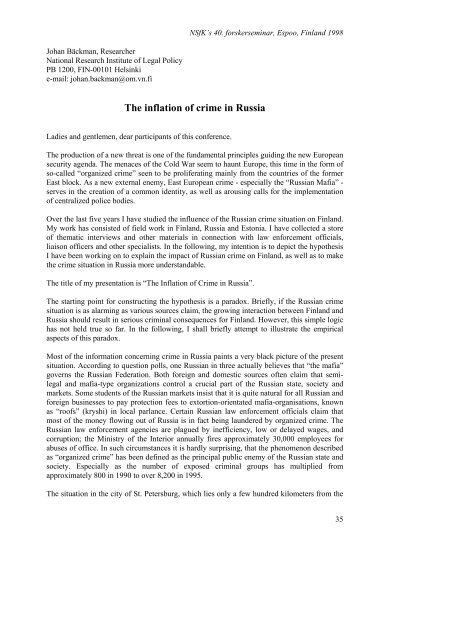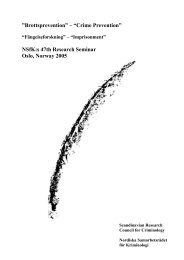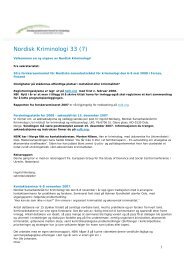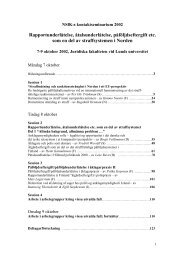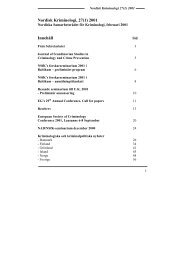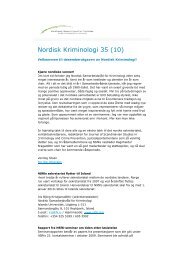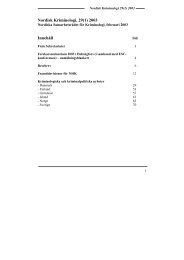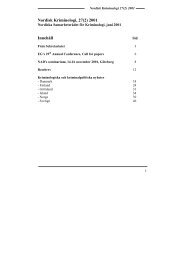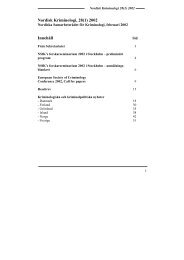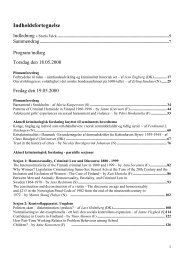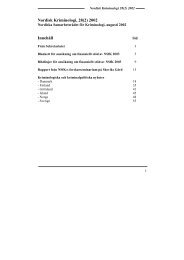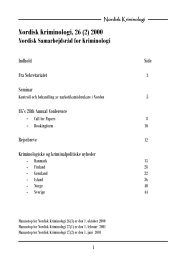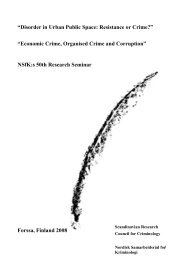Organised Crime & Crime Prevention - what works? - Scandinavian ...
Organised Crime & Crime Prevention - what works? - Scandinavian ...
Organised Crime & Crime Prevention - what works? - Scandinavian ...
You also want an ePaper? Increase the reach of your titles
YUMPU automatically turns print PDFs into web optimized ePapers that Google loves.
Johan Bäckman, Researcher<br />
National Research Institute of Legal Policy<br />
PB 1200, FIN-00101 Helsinki<br />
e-mail: johan.backman@om.vn.fi<br />
NSfK’s 40. forskerseminar, Espoo, Finland 1998<br />
The inflation of crime in Russia<br />
Ladies and gentlemen, dear participants of this conference.<br />
The production of a new threat is one of the fundamental principles guiding the new European<br />
security agenda. The menaces of the Cold War seem to haunt Europe, this time in the form of<br />
so-called “organized crime” seen to be proliferating mainly from the countries of the former<br />
East block. As a new external enemy, East European crime - especially the “Russian Mafia” -<br />
serves in the creation of a common identity, as well as arousing calls for the implementation<br />
of centralized police bodies.<br />
Over the last five years I have studied the influence of the Russian crime situation on Finland.<br />
My work has consisted of field work in Finland, Russia and Estonia. I have collected a store<br />
of thematic interviews and other materials in connection with law enforcement officials,<br />
liaison officers and other specialists. In the following, my intention is to depict the hypothesis<br />
I have been working on to explain the impact of Russian crime on Finland, as well as to make<br />
the crime situation in Russia more understandable.<br />
The title of my presentation is “The Inflation of <strong>Crime</strong> in Russia”.<br />
The starting point for constructing the hypothesis is a paradox. Briefly, if the Russian crime<br />
situation is as alarming as various sources claim, the growing interaction between Finland and<br />
Russia should result in serious criminal consequences for Finland. However, this simple logic<br />
has not held true so far. In the following, I shall briefly attempt to illustrate the empirical<br />
aspects of this paradox.<br />
Most of the information concerning crime in Russia paints a very black picture of the present<br />
situation. According to question polls, one Russian in three actually believes that “the mafia”<br />
governs the Russian Federation. Both foreign and domestic sources often claim that semilegal<br />
and mafia-type organizations control a crucial part of the Russian state, society and<br />
markets. Some students of the Russian markets insist that it is quite natural for all Russian and<br />
foreign businesses to pay protection fees to extortion-orientated mafia-organisations, known<br />
as “roofs” (kryshi) in local parlance. Certain Russian law enforcement officials claim that<br />
most of the money flowing out of Russia is in fact being laundered by organized crime. The<br />
Russian law enforcement agencies are plagued by inefficiency, low or delayed wages, and<br />
corruption; the Ministry of the Interior annually fires approximately 30,000 employees for<br />
abuses of office. In such circumstances it is hardly surprising, that the phenomenon described<br />
as “organized crime” has been defined as the principal public enemy of the Russian state and<br />
society. Especially as the number of exposed criminal groups has multiplied from<br />
approximately 800 in 1990 to over 8,200 in 1995.<br />
The situation in the city of St. Petersburg, which lies only a few hundred kilometers from the<br />
35


